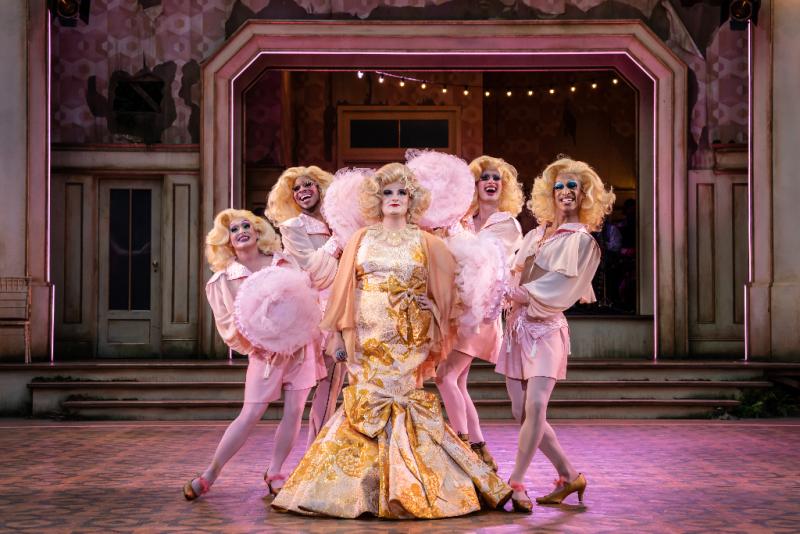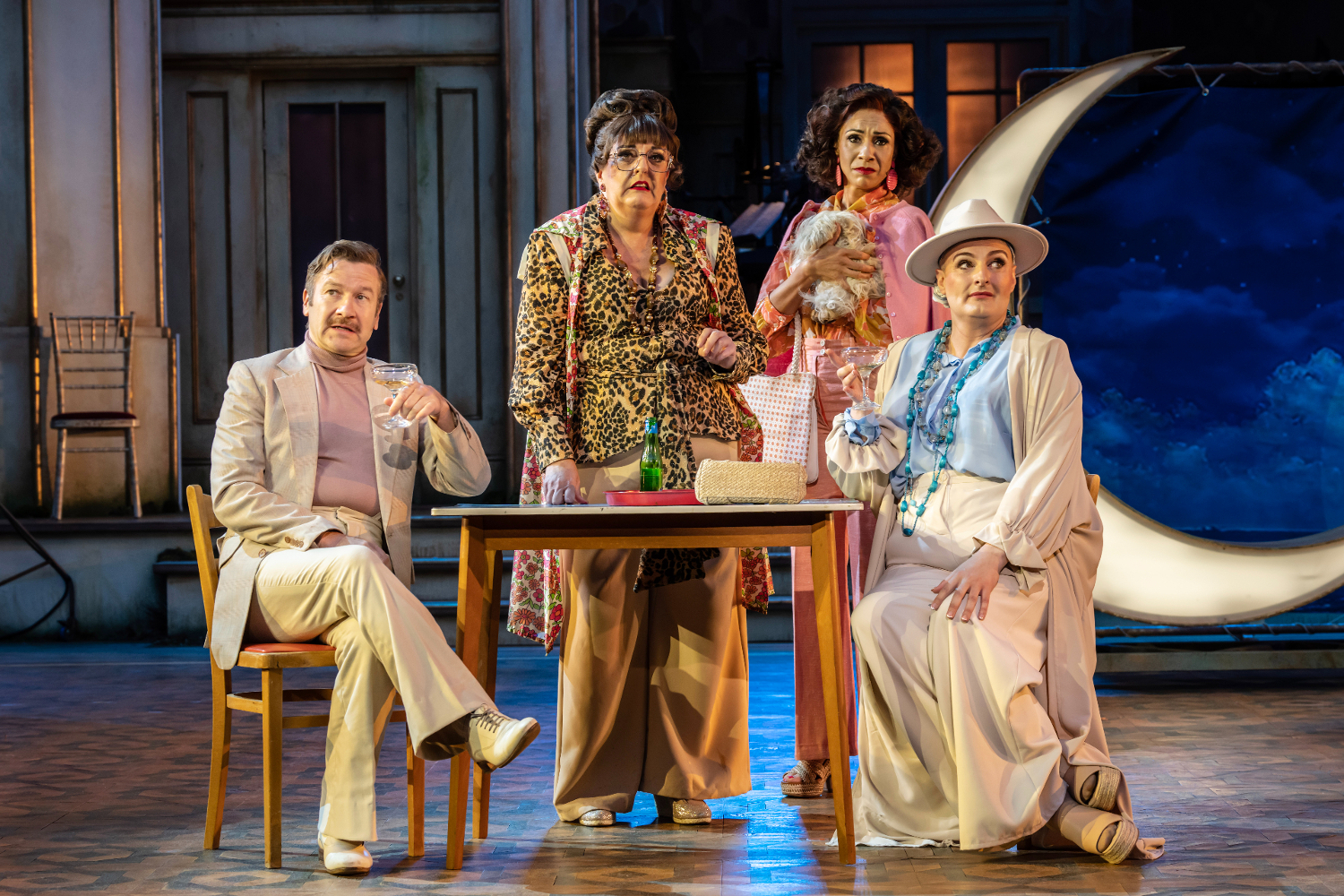La Cage Aux Folles, Regent's Park Open Air Theatre review - 40 years on, the drag show still entertains and educates | reviews, news & interviews
La Cage Aux Folles, Regent's Park Open Air Theatre review - 40 years on, the drag show still entertains and educates
La Cage Aux Folles, Regent's Park Open Air Theatre review - 40 years on, the drag show still entertains and educates
Feelgood show acquires added poignancy on an emotional night

Forty years ago, the world was very different for gay men. AIDS was devastating their communities, especially in the big cities where hard-won enclaves of acceptance were being hollowed out, one sunken-eyed friend after another. Media screamed “Gay Plague” and some politicians barely suppressed their glee at the “perverts’” comeuppance.
Allies were thin on the ground, the redtop press with their finger on the outing trigger never happier than when destroying lives for circulation.
Into such a hostile, fearful, vicious world, Harvey Fierstein and Jerry Herman launched La Cage Aux Folles on Broadway, a feelgood show about two gay men in Saint-Tropez set against the backdrop of a nightclub drag show. It must have been a tricky sell to the backers – but, four decades on and after many revivals around the world, the show returns in triumph to Regent’s Park Open Air Theatre. Like Georges and Albin, they have made a good decision. The men are the owner and star turn respectively of the eponymous cabaret, whom we first meet bickering like the old married couple they are, Georges slightly shifty, a born ducker and diver; Albin as much drama queen offstage as drag queen onstage, but we see the love between them and we sense that it’s going to be tested.
The men are the owner and star turn respectively of the eponymous cabaret, whom we first meet bickering like the old married couple they are, Georges slightly shifty, a born ducker and diver; Albin as much drama queen offstage as drag queen onstage, but we see the love between them and we sense that it’s going to be tested.
And it soon is when Georges’ son, Jean-Michel (raised by the couple from a toddler) arrives on the Riviera to announce that he’s to be married to the daughter of the very same rightwing politician campaigning to close La Cage down! A contrivance? Sure, but we roll with it and see the dilemma facing Jean-Michel’s parents who have lived so easily in their own world when the bigoted, blinded outsiders gatecrash their fragile subculture. As ever with the rich and powerful, buttressed by entitlement and wilful ignorance, they’re not going to change, so should Georges and, especially, the cross-dressing Albin?
If the plot requires a stretching of credibility, give it the benefit of the doubt and you’ll be rewarded with a tremendous night out. On his farewell show as artistic director before departing for the Donmar, Tim Sheader commands this often tricky space to create the illusion of an intimate cabaret, the showgirls filling the stage in a variety of increasingly outrageous costumes, Ryan Dawson Laight dragging up six footers and five footers, rake thin and comfortably built, men who look like women and men who look like men. The message is clear. Drag queens walk amongst us, just waiting their turn to find their true expression – their otherworldliness is the product of imagination and talent, even when reading books in public libraries. And who, really, can fear that?
Another problem which can raise its head in the open air (in plenty of other theatres too to be fair) is sound, but Nick Lidster for Autograph creates a gorgeous soundscape allowing Ben van Tienen’s nine piece band to play some of the 20th century’s most loved musical theatre songs with the gusto they require.
None of this matters much if the performances are drowned by the spectacle but here they’re not. The Cagelles arrive in ever-more spectacular costumes to perform ever-more elaborate routines (by Stephen Mear in top form) and their bitching is witty and warm. Hemi Yeroham delivers a tremendous turn as the lusty stage manager, Francis, having a lot of fun with the towering Hanna (Jak Allen-Anderson), and Shakeel Kimotho gets her fair share of one-liners in as the maid, Jacob, who dreams of stardom.
The show turns on whether we buy the steadfast love that anchors the central relationship, the solid centre amidst the whirlpool of the glamour and the gaudy. Billy Carter’s Georges (pictured above, with Daniele Coombe, Debbie Kurup and Carl Mullaney) makes for a lovable chancer, the cabaret compère who has the glint of Emcee’s eye, but none of his malevolence. Carter sings beautifully, and he continually (to me at least) suggested an answer to the question, “What would Leslie Phillips be like were he gay?” You feel his dilemma when torn between the son he loves and the man he loves, without evident sadness overwhelming his upbeat nature: not an easy acting brief, but pitched perfectly.
That said, the show sits on Carl Mullaney’s amply padded shoulders. His Albin/Zaza is the receptacle for all the turmoil of rejection and acceptance, not just within the world of the play but outside, where the forces of reaction represented by his fiancee’s father, Edward Dindon, are once more on the march. It’s a burden he carries with a supreme lightness of touch in the comic moments and a shattering emotional depth in the showstopping “I Am What I Am” anthem that closes the first half. He should keep his diary free when the awards season rolls round.
While the wonderfully optimistic song, “The Best Of Times” captured the show’s upbeat philosophy, there was a postscript to on the night I saw it and it’s a postscript to the review too.
Forty years ago, the world was different for gay men, but not as different as might have been claimed just 24 hours earlier. Two men had been stabbed outside The Two Brewers in Clapham while one of the chorus was performing inside, a show attended by some of the cast, caught in the backwash and horror of an unashamedly homophobic attack. In London, In 2023. Mullaney, voice cracking a little, spoke to a shocked audience at the curtain and told us that the cast and creatives (like us) stood with the victims.
My reflection making my way through the darkness of the park was that things were better, but not right, resistance still the only answer to the reaction, filtered through the love that suffused the previous two hours. Oh, and call the attack what it was - terrorism - and treat it as such in the justice system.
The future of Arts Journalism
You can stop theartsdesk.com closing!
We urgently need financing to survive. Our fundraising drive has thus far raised £49,000 but we need to reach £100,000 or we will be forced to close. Please contribute here: https://gofund.me/c3f6033d
And if you can forward this information to anyone who might assist, we’d be grateful.

Subscribe to theartsdesk.com
Thank you for continuing to read our work on theartsdesk.com. For unlimited access to every article in its entirety, including our archive of more than 15,000 pieces, we're asking for £5 per month or £40 per year. We feel it's a very good deal, and hope you do too.
To take a subscription now simply click here.
And if you're looking for that extra gift for a friend or family member, why not treat them to a theartsdesk.com gift subscription?
more Theatre
 Romans: A Novel, Almeida Theatre review - a uniquely extraordinary work
Alice Birch’s wildly epic family drama is both mind-blowing and exasperating
Romans: A Novel, Almeida Theatre review - a uniquely extraordinary work
Alice Birch’s wildly epic family drama is both mind-blowing and exasperating
 The Producers, Garrick Theatre review - Ve haf vays of making you laugh
You probably know what's coming, but it's such great fun!
The Producers, Garrick Theatre review - Ve haf vays of making you laugh
You probably know what's coming, but it's such great fun!
 Not Your Superwoman, Bush Theatre review - powerful tribute to the plight and perseverance of Black women
Golda Rosheuvel and Letitia Wright excel in a super new play
Not Your Superwoman, Bush Theatre review - powerful tribute to the plight and perseverance of Black women
Golda Rosheuvel and Letitia Wright excel in a super new play
 Cow | Deer, Royal Court review - paradox-rich account of non-human life
Experimental work about nature led by Katie Mitchell is both extraordinary and banal
Cow | Deer, Royal Court review - paradox-rich account of non-human life
Experimental work about nature led by Katie Mitchell is both extraordinary and banal
 Deaf Republic, Royal Court review - beautiful images, shame about the words
Staging of Ukrainian-American Ilya Kaminsky’s anti-war poems is too meta-theatrical
Deaf Republic, Royal Court review - beautiful images, shame about the words
Staging of Ukrainian-American Ilya Kaminsky’s anti-war poems is too meta-theatrical
 Laura Benanti: Nobody Cares, Underbelly Boulevard Soho review - Tony winner makes charming, cheeky London debut
Broadway's acclaimed Cinderella, Louise, and Amalia reaches Soho for a welcome one-night stand
Laura Benanti: Nobody Cares, Underbelly Boulevard Soho review - Tony winner makes charming, cheeky London debut
Broadway's acclaimed Cinderella, Louise, and Amalia reaches Soho for a welcome one-night stand
 The Pitchfork Disney, King's Head Theatre review - blazing with dark energy
Thrilling revival of Philip Ridley’s cult classic confirms its legendary status
The Pitchfork Disney, King's Head Theatre review - blazing with dark energy
Thrilling revival of Philip Ridley’s cult classic confirms its legendary status
 Born with Teeth, Wyndham's Theatre review - electric sparring match between Shakespeare and Marlowe
Rival Elizabethan playwrights in an up-to-the-minute encounter
Born with Teeth, Wyndham's Theatre review - electric sparring match between Shakespeare and Marlowe
Rival Elizabethan playwrights in an up-to-the-minute encounter
 Interview, Riverside Studios review - old media vs new in sparky scrap between generations
Robert Sean Leonard and Paten Hughes make worthy sparring partners
Interview, Riverside Studios review - old media vs new in sparky scrap between generations
Robert Sean Leonard and Paten Hughes make worthy sparring partners
 Fat Ham, RSC, Stratford review - it's Hamlet Jim, but not as we know it
An entertaining, positive and contemporary blast!
Fat Ham, RSC, Stratford review - it's Hamlet Jim, but not as we know it
An entertaining, positive and contemporary blast!
 Juniper Blood, Donmar Warehouse review - where ideas and ideals rule the roost
Mike Bartlett’s new state-of-the-agricultural-nation play is beautifully performed
Juniper Blood, Donmar Warehouse review - where ideas and ideals rule the roost
Mike Bartlett’s new state-of-the-agricultural-nation play is beautifully performed
 The Gathered Leaves, Park Theatre review - dated script lifted by nuanced characterisation
The actors skilfully evoke the claustrophobia of family members trying to fake togetherness
The Gathered Leaves, Park Theatre review - dated script lifted by nuanced characterisation
The actors skilfully evoke the claustrophobia of family members trying to fake togetherness

Add comment